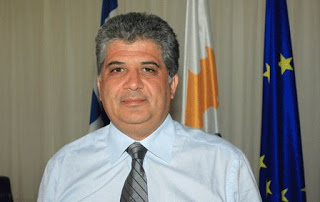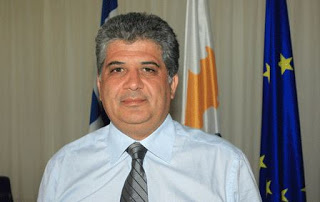The educational reform started to be implemented this year. First in primary education and within the next two years in high schools and lyceums. The Minister of Education, George Demosthenous, is convinced that he will create the conditions to provide outlets, at all levels, to students. At the same time, the school is being modernized and brought closer to young people, with the introduction of technological means, such as the internet in every classroom and digital textbooks.
- How is the financial crisis affecting public education and the public school?
- Although the expenditures for education have not been significantly affected, the crisis has made us seriously think and study ways to make more efficient use of these investments, so that each expenditure will yield positive educational results. The reductions in our ministry mainly concerned the budgets of the public universities - in the context of the effort for general tidiness - and the technical services, without of course the priority projects such as e.g. seismic support of buildings and technological upgrading of schools. Our concern is mostly about the cost-benefit interface. The cost to date is not entirely consistent with the results we have in terms of student performance, so educational reform is the big bet.
- How is the reform going?
- The theory began to be put into practice this year. We have the gradual introduction of the new curricula and the implementation of the new program schedule in primary education. At the same time, we are completing the discussion with the educational organizations, in order to move forward from the new school year with the new timetables in high schools and the following school year to gradually move forward with the implementation of the new structure and the new timetable in high schools. At the same time, we are proceeding with the substantial and at the same time methodical technological upgrade of our schools.
- Means;
- Internet in all schools, computers and projectors permanently installed in all rooms.
- But are there still schools that do not have internet?
- Internet is available in all schools. Our goal is to have it in all classrooms. The main issue is to give the teachers the appropriate support, so that they get away from the frontal teaching and offer to the students what is described in the new curricula and with the use of modern means.
- Where are we with digital manuals?
The Online School, a project co-financed by the European Social Fund, is a digital learning environment piloted in seven schools. The purpose of the pilot application is to diagnose and investigate the difficulties but also the possibilities that the application of a new and innovative learning environment may have, so that we are then - and based on the experience that will be gained - ready for its expansion. , with the best possible conditions. I have already asked for a meeting with these seven schools, within the month, to analyze and evaluate the results. After the evaluation, a plan will be prepared to implement the successful aspects of the so-called Jupiter program in other schools as well. As for the e-learning material of the program, which I had the opportunity to attend, I believe that it is extremely structured and can help and integrate students and teachers in another dimension. For the needs of the operation of the Online School, a Digital Educational Content was prepared for the lessons of the high school and the technical schools, attractive and original, which is already used in all the high schools and the technical schools.
- Such educational methods are closer to modern students…
- You know, electronic material needs special attention. In the sense that in the beginning it is very attractive and helpful, but because sometimes the knowledge and experiences of children are such that they exceed a certain level of knowledge and content, there is a form of fatigue or indifference. Therefore, how you manage this material plays an important role.
- But there is a gap. At home, children live in a digital world and at school they are asked to act in a "manual" environment. This may also have to do with their performance.
- There is, yes, a gap, but we are constantly reducing it, upgrading schools technologically. In this context, we have introduced from this year, gradually and in several schools, the institution in which students once a week carry their laptop to school and use it in class. More than 20 students have benefited from the purchase of a computer-sponsored computer and, using it through the educational process, discover how powerful a tool it can be - without straying from the printed book and emphasizing that computers can not replace true human relationships.
- But alienation is not due to computers. It already existed in schools, something that can be seen through various symptoms, such as student absences and antisocial behavior. Shouldn't we create a school environment that gives a deeper education, meaning to existence and brings out political beings?
- What you mention is the heart of the changes that are made with the new curricula. Until today, the school was knowledge-based. In the new programs, the material is limited to an adequate and coherent body of knowledge, selected on the basis of strictly defined criteria, so that the "road race to cover the material" is a thing of the past, in which teachers and students traditionally engage in serious negative learning outcomes. of our schools and student performance. At the same time, the new curriculum aims to cultivate active democratic citizenship and to develop the special skills, abilities and skills that are increasingly required in the 21st century, such as creativity, willingness and the ability to work together. The bets we want to win are about the outlets we want to give to the students. We want to get away from the model of the robot student, the anxious and isolated student.
Private university schools will join the pan-Cypriot exams
"Successful children will be able to enjoy state-sponsored tuition"
- However, the results in schools may be disproportionate to the costs, but on the other hand we also have a high percentage of graduates and dozens of unemployed scientists. Do we need to re-evaluate the subjects and set new priorities?
- The EU requires that 40% of the active population be graduates. We are in the top countries, with a percentage of just over 40%. The answer to unemployment is not the deprivation of the right to a degree. The further development of the local economy and the creation of new jobs and new perspectives to channel the experiences and knowledge of unemployed graduates are what will provide the answer to the phenomenon of unemployment.
- Do you discuss these issues with the Ministry of Labor? And Mr. Pissaridis had put himself at your disposal for discussion.
- We are in line with the Ministry of Labor. The goal is, through our plans, to give real outlets to young people. In this context, we promoted the proposal for the creation of a Lifelong Guidance Body, where young people, the unemployed, but also people who wish to make a change in their professional orientation can apply. With Mr. Pissaridis, very recently, we discussed in detail the problems and the issue of the role of universities. We agreed that universities need to be flexible in order to enrich their curricula and introduce courses that are in line with modern developments. An example is the search, update and enrichment of the engineering curriculum e.g. on gas issues. At the same time, Mr. Pissaridis accepted our proposal to advise us on the introduction of the important innovation that we promote, the Post-Secondary Institutes of Vocational Education and Training.
- Do you have contacts with the universities themselves?
- At the moment we have completed the mapping of the university web to know what study programs each university offers, public and private. Is that enough? Of course not. We want to know what the available places are, what percentage in addition to the available places is the active number of students in each program, where the maximum overlaps are presented. Then we will see how the number of students is related to needs recorded in the market or where saturation occurs. All this will be a framework for discussion with universities. Only then will there be a better result.
- Are there any thoughts about imposing tuition fees on public universities?
- No. Free education is a good thing that we will support. What we are discussing is how to create the conditions for the universities themselves to be able to bring in resources, through research programs, and to create, if not their financial independence, an important source of resources. At the same time, we have created a committee with the participation of universities, public and private, to find ways to support them.
- Financial support;
- Not only. Among our thoughts is the adoption of new regulations, so that in a more flexible way new curricula of schools and departments are approved. The procedures are currently time consuming. Another idea, which is in its very early stages because we should first look at the cost-benefit, is to include some private university faculties in the pan-Cypriot exams. Those children who succeed will be able to enjoy state-sponsored tuition.
Source: KATHIMERINI

